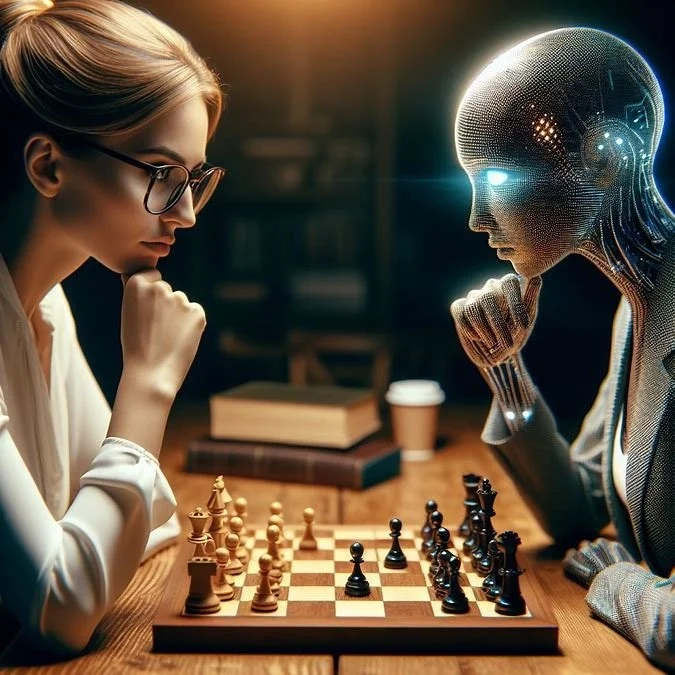Can AI Beat Humans at Games?
The question “Can AI beat humans at games?” has evolved from a theoretical debate to a series of groundbreaking events that have reshaped our understanding of intelligence, strategy, and creativity. From chess to complex multiplayer games, artificial intelligence has not only matched but often surpassed human capabilities. This article delves into the milestones where AI has triumphed over human players, the underlying technologies enabling these feats, and the broader implications for various fields.
Major Milestones: AI Triumphs Over Humans
1. Deep Blue vs. Garry Kasparov (1997)
In 1997, IBM’s Deep Blue made history by defeating world chess champion Garry Kasparov in a six-game match. This victory was a significant milestone, demonstrating that machines could handle the deep strategic thinking required in chess. Kasparov’s loss highlighted the potential of AI in processing vast amounts of information and evaluating numerous possible moves in real-time.
2. AlphaGo vs. Lee Sedol (2016)
Go, an ancient Chinese board game, was long considered a domain where AI would struggle due to its complexity and the intuitive nature of human play. However, in 2016, Google’s DeepMind developed AlphaGo, which defeated world champion Lee Sedol. One of AlphaGo’s moves, Move 37, was particularly notable for its creativity and unexpectedness, showcasing AI’s potential for innovative strategies.
3. AlphaStar in StarCraft II (2019)
StarCraft II is a real-time strategy game that requires quick decision-making, resource management, and tactical execution. In 2019, DeepMind’s AlphaStar achieved Grandmaster status, placing it among the top 0.2% of human players. AlphaStar’s success was attributed to its ability to learn from human gameplay and improve through reinforcement learning.
4. Pluribus in Poker (2019)
Poker, especially the no-limit Texas Hold’em variant, involves incomplete information and psychological elements like bluffing. In 2019, Facebook AI Research and Carnegie Mellon University developed Pluribus, an AI that defeated professional human players in six-player no-limit Texas Hold’em. Pluribus’s ability to handle imperfect information and make strategic decisions marked a significant achievement in AI development.
5. Cicero in Diplomacy (2024)
Diplomacy is a strategy board game that emphasizes negotiation, alliances, and betrayal. In 2024, Meta’s AI system, Cicero, demonstrated advanced social reasoning by placing in the top 10% of human players. Cicero’s performance highlighted AI’s growing proficiency in understanding and engaging in complex social interactions.
The Technology Behind AI’s Success
AI’s ability to excel in games stems from several advanced technologies:
- Deep Learning: Neural networks enable AI to learn from large datasets, identifying patterns and making decisions without explicit programming.
- Reinforcement Learning: AI systems learn optimal strategies by receiving feedback from their actions, allowing them to improve over time.
- Monte Carlo Tree Search: This algorithm helps AI evaluate possible moves in games by simulating numerous scenarios, aiding in decision-making.
- Natural Language Processing: In games like Diplomacy, AI uses NLP to understand and generate human language, facilitating communication and negotiation.
Human Resilience: Areas Where AI Falls Short
Despite AI’s achievements, there are areas where human players still hold an advantage:
- Creativity: Humans often devise unconventional strategies that AI may not anticipate.
- Adaptability: In dynamic environments, humans can quickly adjust to new rules or unexpected changes.
- Psychological Insight: In games involving bluffing or deception, human players can read opponents’ emotions and intentions, a skill AI is still developing.
For instance, in the 2025 AtCoder World Tour Finals, Polish programmer Przemysław “Psyho” Dębiak defeated OpenAI’s custom AI model in a 10-hour coding marathon, demonstrating human ingenuity in problem-solving.
The Future of AI in Gaming
Looking ahead, AI’s role in gaming is poised to expand:
- Enhanced Training Tools: AI can serve as a training partner for players, offering challenges that adapt to individual skill levels.
- Game Design: AI can assist developers in creating more dynamic and engaging game environments by simulating various scenarios.
- Ethical Considerations: As AI becomes more integrated into gaming, discussions around fairness, transparency, and the impact on human players will become increasingly important.
FAQ: Can AI Beat Humans at Games?
Q1: Can AI beat humans at games like chess and Go?
Yes, AI has surpassed human champions in games such as chess and Go, demonstrating advanced strategic thinking and pattern recognition.
Q2: Are there games where humans still outperform AI?
Yes, in areas requiring creativity, adaptability, and psychological insight, humans often have the edge over AI.
Q3: What technologies enable AI to beat humans at games?
AI’s success in games is due to advancements in deep learning, reinforcement learning, Monte Carlo tree search, and natural language processing.
Q4: How does AI’s performance in games impact other fields?
Insights gained from AI’s performance in games can influence areas like robotics, education, and decision-making processes in complex environments.
Q5: Will AI continue to beat humans at games in the future?
While AI will continue to excel in many games, human creativity and adaptability will remain valuable in areas that require nuanced understanding and innovation.
Conclusion: The Evolving Landscape of AI and Human Competition
The journey of AI in surpassing humans at games reflects broader trends in technology and society. While AI has achieved remarkable feats, the interplay between human ingenuity and machine learning continues to evolve. Future advancements may see AI and humans collaborating more closely, leveraging each other’s strengths to tackle complex challenges. Understanding this dynamic will be crucial as we navigate the future of AI in various domains.

